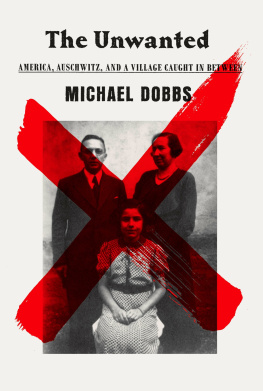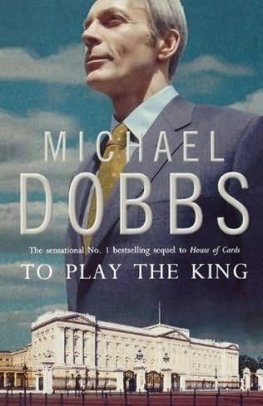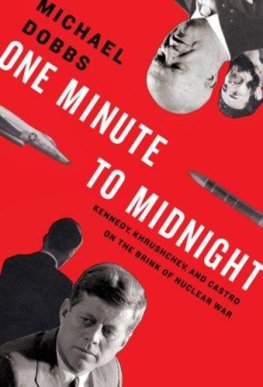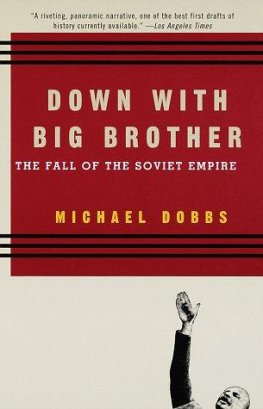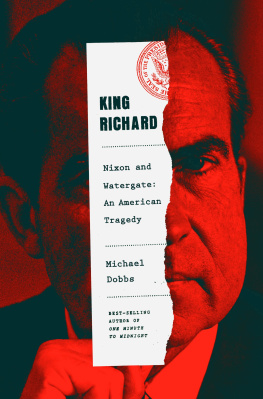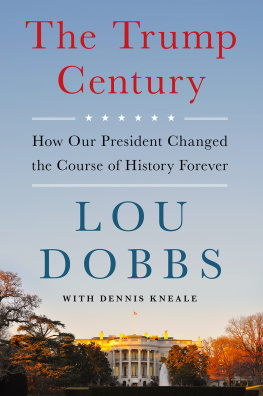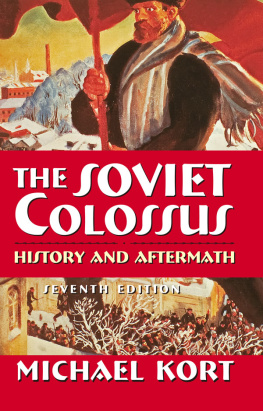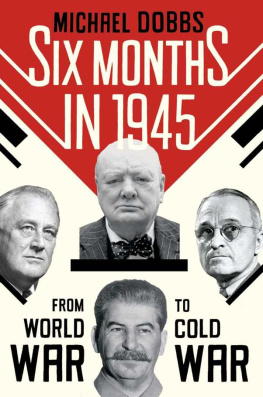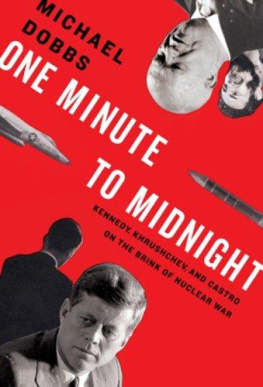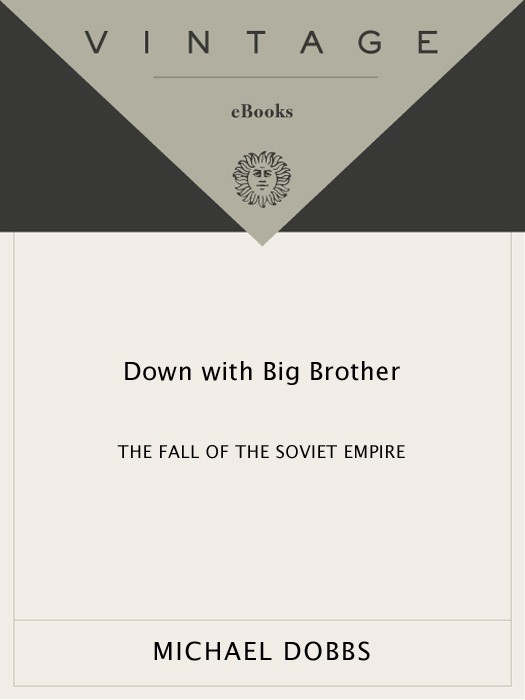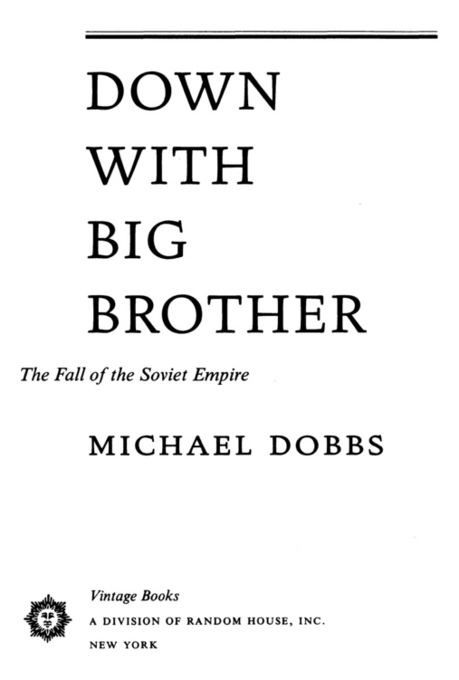Acclaim for
MICHAEL DOBBSs
DOWN WITH BIG BROTHER
Combines the astonished gaze of an eyewitness with the deeper knowledge of a historian, providing a vivid, insightful account of what happened.
The New York Times
[Dobbs] weaves this complex story together with the kind of fascinating details and snippets of conversation that constantly offer new insights into seemingly familiar events.
Los Angeles Times
No one knows this story better. Combining the energy of a master reporter and the care of a real historian, Dobbs focuses on the crucial moments of imperial collapse. He seems to have been on every scene and in every archive.
David Remnick
Dobbs has written a straight-ahead narrative that makes good use of the documents coming out of newly opened East bloc archives.
Time
Michael Dobbs seems to have been everywhere at once. His superior skills as a reporter and storyteller alone would be enough to make a gripping account. But he goes deeper, sifting through former officials memoirs and long-sealed archives to produce a significant history, rich in the political and human drama of one of the twentieth centurys landmark events.
David Shipler
MICHAEL DOBBS
DOWN
WITH
BIG
BROTHER
Michael Dobbs was born in Belfast, Northern Ireland. He has spent much of his journalistic career reporting from Communist countries: from 1977 to 1980 as a special correspondent based in Yugoslavia for the Washington Post, the London Guardian, and the BBC; and from 1981 to 1995 as the Washington Posts bureau chief in Warsaw and Moscow (with an intervening stint in Paris). He is currently a diplomatic reporter for the Post.
In addition to having received the Overseas Press Club award for interpretation of foreign news in 1990 and a National Press Club award for best diplomatic reporting in 1995, Dobbs has held fellowships at the Russian Research Center at Harvard University and at the Woodrow Wilson Center in Washington, D.C. He lives in Bethesda, Maryland, with his wife and three children.
FIRST VINTAGE BOOKS EDITION, JANUARY 1998
Copyright 1996 by Michael Dobbs
All rights reserved under International and Pan-American Copyright Conventions. Published in the United States by Vintage Books, a division of Random House, Inc., New York, and simultaneously in Canada by Random House of Canada Limited, Toronto. Originally published in hardcover in the United States by Alfred A. Knopf, Inc., New York, in 1997.
The Library of Congress has catalogued the Knopf edition as follows:
Dobbs, Michael.
Down with Big Brother: the fall of the Soviet empire / by Michael Dobbs.
1st ed.
p. cm.
1. Soviet UnionPolitics and government19531985.
2. Soviet UnionPolitics and government19851991.
I. Title.
DK274.D63 1997
947.084dc20 96-21607
eISBN: 978-0-307-77316-6
Random House Web address: http://www.randomhouse.com/
v3.1
FOR LISA
His eyes refocussed on the page. He discovered that while he sat helplessly musing he had also been writing, as though by automatic action. And it was no longer the same cramped awkward handwriting as before. His pen had slid voluptuously over the smooth paper, printing in large neat capitals
DOWN WITH BIG BROTHER
DOWN WITH BIG BROTHER
DOWN WITH BIG BROTHER
DOWN WITH BIG BROTHER
DOWN WITH BIG BROTHER
over and over again, filling half a page.
George Orwell, 1984
CONTENTS
ACKNOWLEDGMENTS
T HIS BOOK IS THE OUTCOME of reporting tours in Yugoslavia, Poland, and the Soviet Union between 1977 and 1993. But my interest in the former Communist world goes back long before that. I was eight weeks old when I first went to Russia, courtesy of my parents, Joseph and Marie Dobbs, who had met at the British embassy in Moscow in 1948. I was to visit Russia, in one capacity or another, under all Russian leaders from Stalin to Yeltsin. When I went to work in Yugoslavia and Poland, I was also following in the footsteps of my peripatetic parents. I therefore have them primarily to thank for ushering me into the shadow of Big Brother and getting me to write about the experience.
While gathering material for this book, I have benefited from the stimulating conversation and hospitality of friends, colleagues, and sources in many different countries. I mention many of these sources in the endnotes, but I would particularly like to thank a few people who assisted directly in my research. In common with other Washington Post reporters in Moscow, I was fortunate to be able to draw on the advice and assistance of Masha Lipman, a talented Russian journalist who has gone on to become managing editor of the news magazine Itogi. Here in Washington, I would like to thank two research associates, Brian Sloyer and Marian Alves, who spent long hours at the Library of Congress on my behalf. I am also indebted to Mark Kramer, of Harvard University, who supplied me with many interesting documents from Soviet and East European archives.
My agent, Rafe Sagalyn, and my editor at Knopf, Ashbel Green, played key roles in encouraging me to write this book and shepherding it to completion. Other people who made helpful comments on the manuscript were Jeff Frank, now with The New Yorker, my former Moscow colleague Fred Hiatt, and David Brown, a medical reporter for the Post. Responsibility for any remaining errors rests with me. I would also like to thank Don Oberdorfer, a former diplomatic reporter for the Post and author of The Turn, for making available the transcripts of two Princeton University conferences on the end of the Cold War. These proved very helpful.
The collapse of communism was one of the great news stories of the twentieth century. I will always be grateful to the editors of the Washington Post, particularly Jim Hoagland and Michael Getler, for assigning me to cover many of its most dramatic episodes, beginning with the Polish labor unrest of August 1980. My understanding of the story was greatly enriched by talks with present and former Post reporters, including Bradley Graham, Jackson Diehl, Robert Kaiser, Dusko Doder, Celestine Bohlen, Gary Lee, Fred Hiatt, Margaret Shapiro, David Hoffman, Lee Hockstader, Dan Southerland, Blaine Harden, Mary Battiata, John Pomfret, Christine Spolar, and especially David Remnick. Nobody could wish for better colleagues.
I am happy to acknowledge the support of the Kennan Institute for Advanced Russian Studies of the Woodrow Wilson International Center for Scholars in Washington, D.C. The Kennan Institute provided me with both a fellowship and a congenial place to work, when I returned to Washington from Moscow in August 1993.
Most of all, I am grateful to my family for sharing in my adventures and putting up with my frequent absences. My wife, Lisa, has been my most attentive reader and perceptive critic. My children, Alex, Olivia, and Joseph, are not quite sure what communism was all about, but they know that it took up a lot of their fathers time, long after it had been pronounced dead and buried. One day, they will read this book and understand what those tanks were doing roaring past our front entrance on August 19, 1991.
PREFACE


